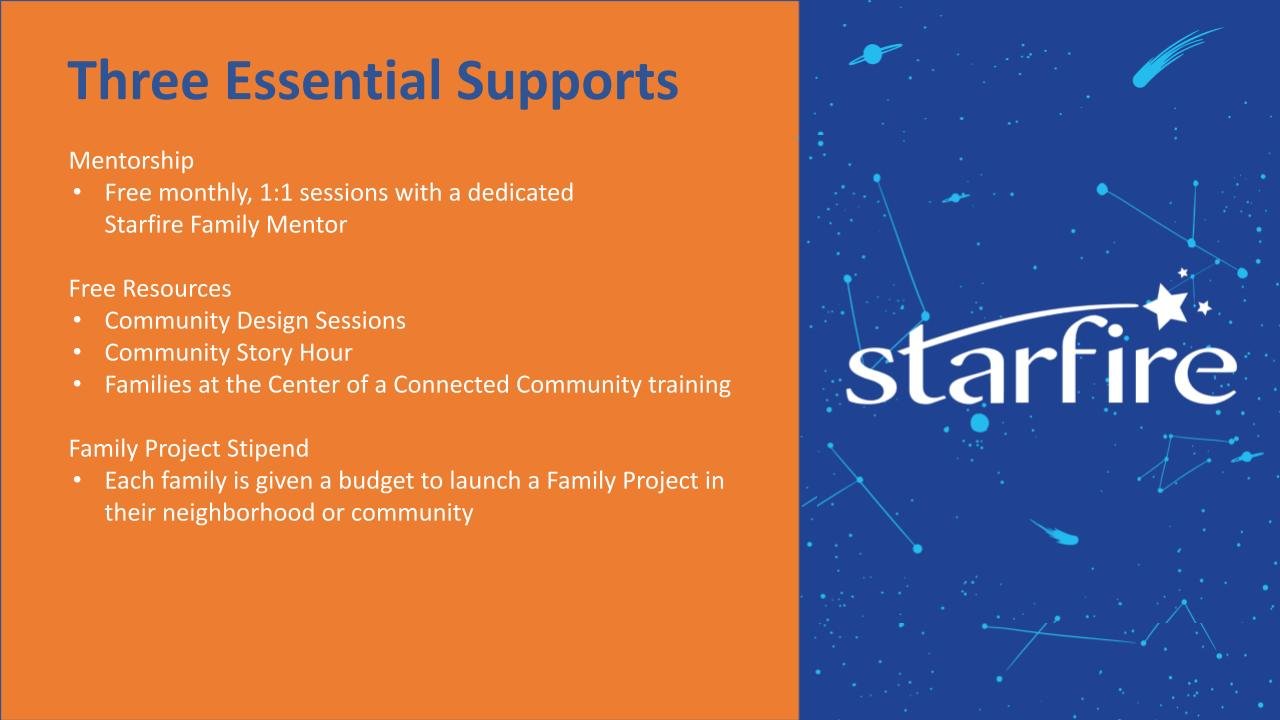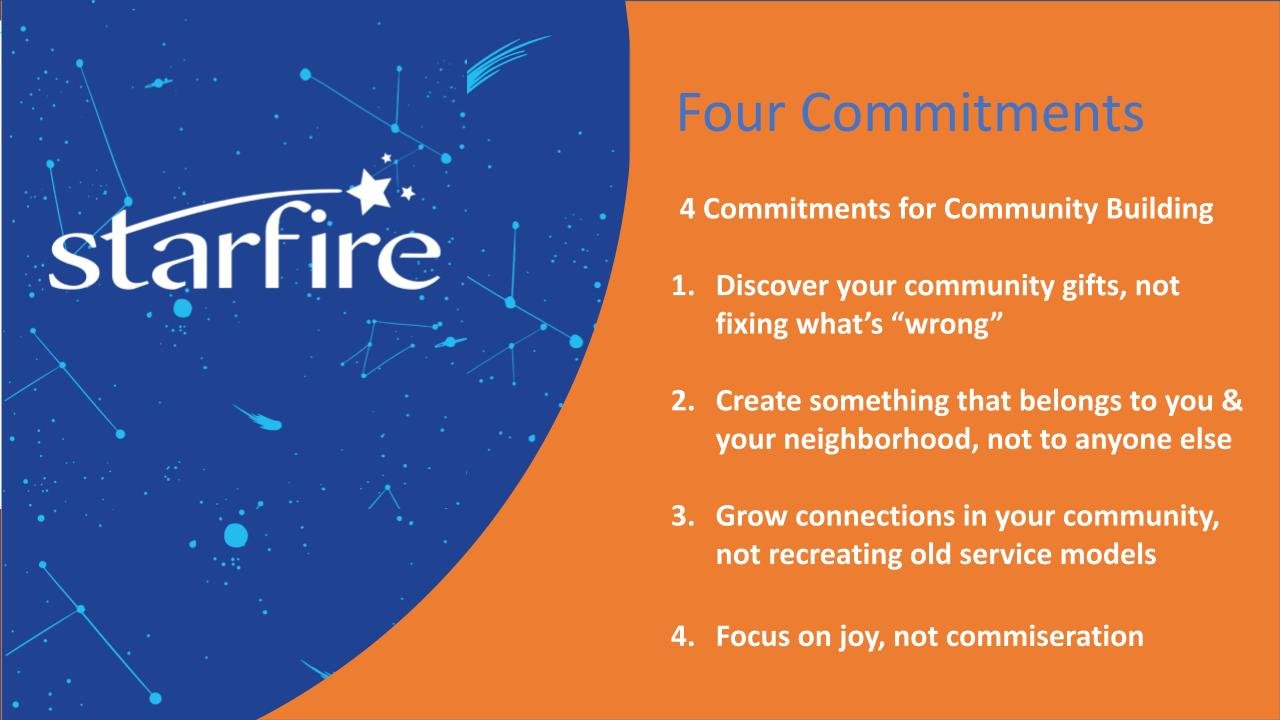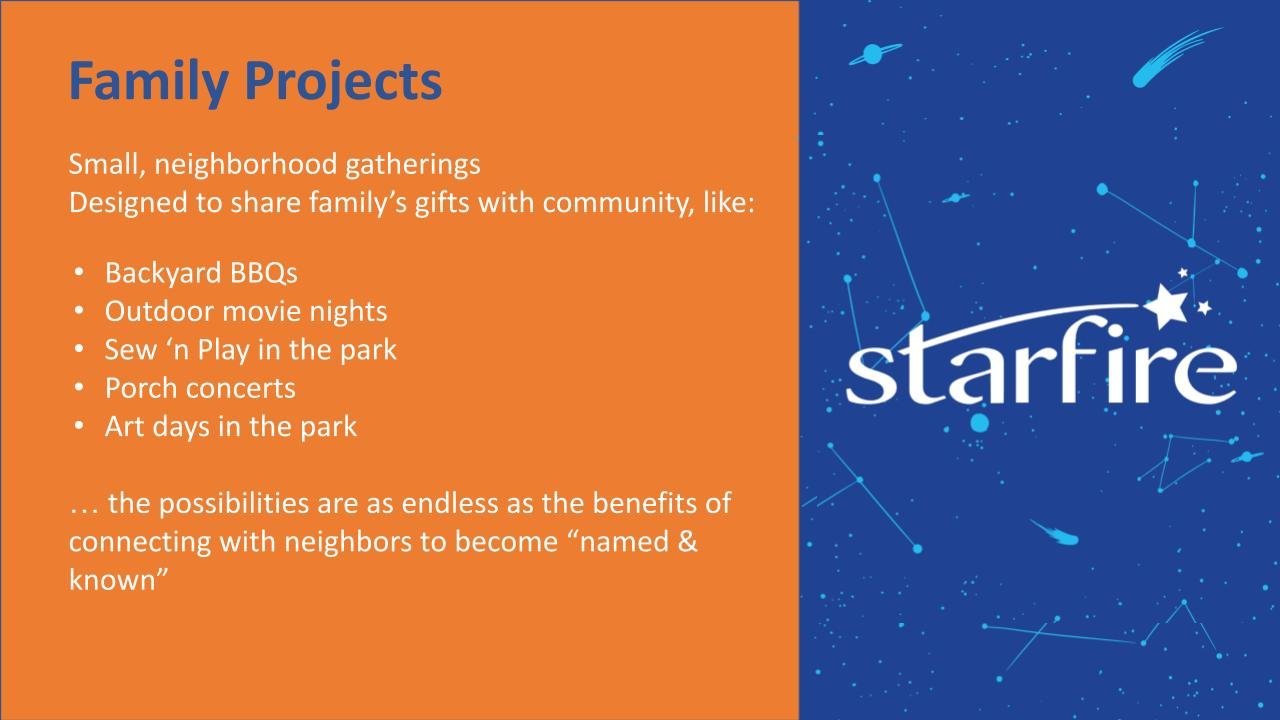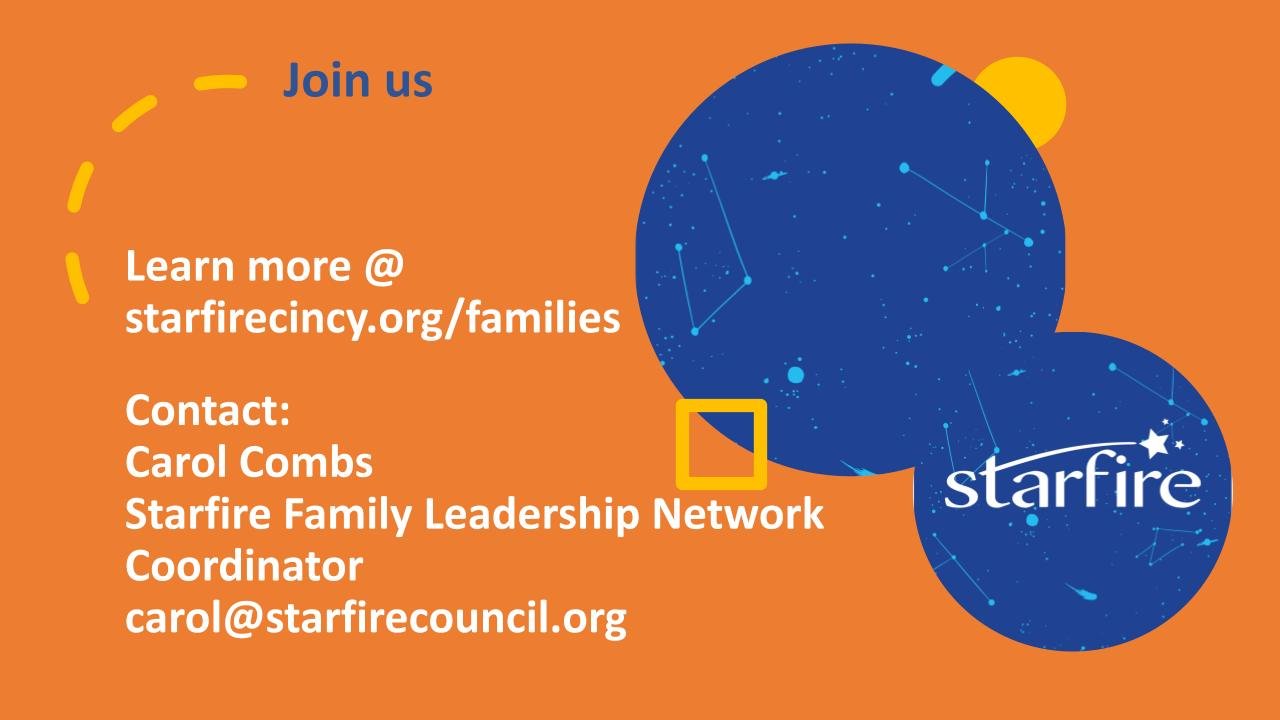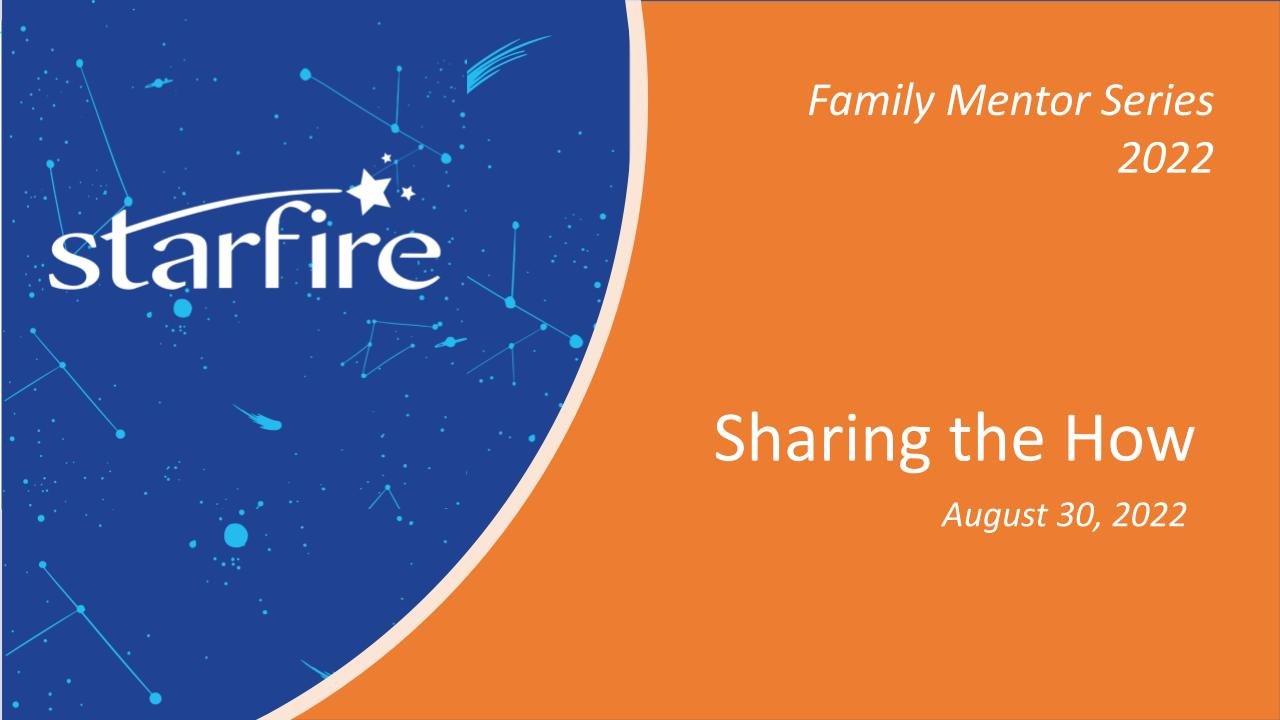Sharing The How | with Starfire Family Mentors
From Starfire, this is a podcast on what's more possible in inclusion, community building and relationships.
Robbie:
Hello and welcome to Starfire's podcast called "More." I'd like you to meet Carol Combs and Hadia Khan and Angela McArthur. These are three of Starfire's family mentors. As family mentors. They guide families of children with intellectual and developmental disabilities to nurture relationships based on common interests versus disabilities and beyond paid staff. As parents of children with disabilities, Starfire, family mentors have firsthand experience breaking the cycle of social isolation, creating sustainable community supports and developing better stories for themselves and their children and loved ones by creating and launching inclusive community projects. They've gathered here today to share the how of participating in the Starfire Family Leadership Network, from how they define community, how they invite others to join and how they support connections that grow into relationships. I wanna start and take 30 seconds and introduce yourselves. Angela, why don't you start us off?
Angela:
So I'm Angela McArthur. I am in North College Hill and my daughter, Julia is nine. She has achondroplasia, which is the most common form of dwarfism. She's my one and only child. So she's spoiled rotten because I'm also an only child that makes her the only grandchild. One thing our family is known for besides advocating for dwarfism is the splash party. It's people driving by would stop. So it was definitely an eye catcher, for sure.
Robbie:
Love it. Hadia, give us your elevator story.
Hadia:
So I'm Hadia Khan my son is Khalid. He's my only son, too. So Angela, I agree with you. Our kids are spoiled like anything. And at times I think my husband tells me I spoil him and I tell him he spoils him. So both of us in the midst of everything, he gets spoiled a lot and he just started high school. So already we were asking him all bunch of questions yesterday. So by the time he got home, it was 5, 5 30. So my husband was like, how was your first day? And he just said, guys, gimme a break. And we were like, okay, he's a teenager. He's our pride. And our joy he's nonverbal, he's deaf. He wears Coch implants. He has a blood disorder, but he made us who we are today as parents. And we are proud of him, how far he's able to accomplish. We were told he might never walk. He took his first steps when he was five. He uses iPad as a speaking device and is a sassy teenager.
Robbie:
And he has two great parents. And that's awesome. So we just learned to walk when he was five, our grandson is five and he's taken his first steps this year. So rock and roll. Hey Carol. Tell us your story.
Carol:
Yeah. So I'm Carol Combs. I live in the city of Hamilton with my three amazing kids, Bri, Grayson and Charlie Grayson is 14 years old and he was born with a developmental disability called CEP. And currently our family is known as the people on Cleveland avenue that always have a rock and porch. And so we are constantly out on the porch meeting and greeting our neighbors and they are counting down to Halloween because we do all things Halloween. And we are the house on our street that has the coolest decorations. So that is currently what our family is known for. But we're also known for activating spaces across the city of Hamilton and being super engaged with our community. We have found our place of belonging and we love it. And so that's who we are and what we're known for
Robbie:
In addition to being a family mentor, Carol is also the coordinator of the program. So Carol let's start us off.
Carol:
Yeah, let's do this. So I head up the Family Leadership Network here at Starfire. It's a family led effort that empowers families of loved ones with developmental disabilities to cast a vision for what's positive and possible for themselves and their families. It's really about discovering interest and identities beyond disability. And it's a place where families become named and known in their communities to create connections that spark real life, meaningful relationships. Part of the family network, there's three essential support. So you get free monthly one-on-one mentoring sessions with a Starfire family mentor, which is someone who has done a project themselves and has stepped into community to do the work alongside their family, free resources, such as community design sessions, community story hours, and the families at the center of a connected community training, where we can just begin to build our muscle around what it takes to build community and connection.
Carol:
And then each family that participates in a project gets a family stipend just as a way to activate and do something really cool and fun in their community. The four commitments is a foundational component of our work and they serve as the guardrails for our family projects. These really help families step into a space where they can create something new and fun. That's unique to them. The four commitments ask families to discover community gifts, not fix what's wrong, create something that belongs to them and their neighborhood. Not anyone else it's about growing connections in your community and not recreating the old service models. And it's a focus on joy. Not commiseration family projects can be big or small. Some of the things that we've seen families acted do and activate in their community, backyard barbecues, outdoor movie nights. So in play at a local park front porch, concerts, art days in the park, the possibilities really are endless and it's really up to the family to decide what their family project is and what it'll become. And what happens is it supports them in becoming named and known in their community.
Robbie:
That's an excellent segue to sharing how. We've got Carol, Hadia and Angela on the podcast today. And let's start with Hadia. Hadia, talk to us about how you define community in your world. What does that look like?
Hadia:
So my idea of community has changed over the years. So I'm originally from Pakistan and I thought community is the people with similar cultures. And what I've realized is having a special needs child is a community of its own. We have a community in children's hospital for my son. We have a community with our neighbors. We have community with our doctors and the teams. So for me, the idea of community has really changed. It is what we give to our community. They own us and it's us who need to go out and express to them that we want to you to help us and help us understand how we can be more productive. So when we did the Starfire project, it helps us to guard out of our comfort zone. We always wanted to reach out to our neighbors, but we always have that hesitancy.
Hadia:
Will they accept us? Will they understand? Because we are the only special needs family in our community and our neighborhood. So once we did our project, they actually asked a lot of questions about what my son's needs were and how they can support. Even to the point when my son is cycling in the neighborhood, he gets a zillion high fives. So for me, that is my community where my son is able to thrive with his own abilities. When we started doing that, we realized that, you know what, my own community, the religion I belong from, the culture I'm from, I was not opening as much to them. So then I started to reach out to them as well. How can we help to eliminate all those barriers? So then my community was open with open arms. They were like, so what can we do differently? So we started a small project of starting a support group within our mosque. So for me, community is whatever you make out of community. So for me, it has changed. It has evolved and I'm proud to be a part of this bigger community. So it's all because of them that we are able to not only give back to the community, but connect with amazing people who help us be better human beings,
Carol:
Your son's a connector. He is a very strong community connector and builder
Hadia:
And it's him because he loves people. He cannot sit home. He has to meet people. He would say good jobs and high fives to everybody who's there. So he's the one actually pushing our comfort zone. For sure.
Robbie:
I'll take a zillion high fives and a group of people asking how they can help and asking the questions that they don't maybe even know to ask. So thank you. Thanks for sharing that. Angela, what about you? How do you define community?
Angela:
I thought in the beginning that it was all about geography. It was just a border of your city, or maybe you could have a church community, but I didn't realize that it's not something that's just happens. I always thought the neighborhood I grew up in, I knew my neighbors, but then when we moved, I didn't know my neighbors anymore. And so community actually is something you have to strive to connect with. Like Hadia said, you have to be willing to extend the invitation, to invite people to your community and work on it yourself.
Robbie:
It is. That's a good pivot. It's not just about geography anymore. Gosh, especially with the pandemic. I mean, the things that we can do online now that we could have never done before work is a great example. And building community is another and nothing beats the face to face, which is a good segue to you. Carol, tell us how you define community.
Carol:
When we first started as a family with Starfire, it tripped me up a little bit. I'll be honest because Angela, I thought it was geographic. And so anytime I heard the word community, the infrastructure of community popped up. John McKnight, one of the mentors said I got to work alongside of, for part of our journey has this great definition of community. And he says that community is just people in relationship. And when I heard that definition, it really supported me in thinking about, oh, well, yeah, this is doable. We can like people in relationship. We can do that. We know people. And so when I started thinking about community in that way, we now define community as those around us, the people that we're in relationship with and the people that we want to make connection with. So for us in the city of Hamilton, it's not just our immediate neighbors, but it's people we've met through the project process that have stepped into the space of knowing us and loving us as a family.
Robbie:
Super well said. I know you've done a number of projects, Carol, in the Hamilton, Ohio community. Talk to us about how you invited people in, especially that first time.
Carol:
Oh man, it is so scary. I will be the first to admit that extending invitations was super scary. And what we did was we just took it and baby steps. So the first invitations I extended were to people that we knew because they were easy. We knew that they would probably say yes if they were free that day to join us for sewing. And that gave us courage to expand a little bit more and post on our local community sites, that we'd be popping up to sew at a local park. And as our time in the community progressed and we got to meet more people, we started extending invitations at the actual event too. Like, Hey, we'll be back next week. Please come back and join us. We would love to get to know you more as we shifted from. So in play to some local events at a park, right next door to our house, we just used those connections that we built. And we started again with the people that we thought would say yes, because that helped us build our muscle to extend an invitation. We got some nos along the way, but we also got yeses. And what we come to realize is that it was always gonna be a no, unless we asked. And that helped us gain some courage and extending invitations a little bit further and wider as we went along.
Robbie:
Always going to be a no, unless we ask, that's a pretty powerful line. Hadia. How about you? How do you invite others? Neighbors, friends, colleagues. How do you invite them into your space?
Hadia:
I think girls said that the first steps are hard, but the community is willing to accept us with open arms. The second I shared my idea with my neighbor, one of my neighbors, she was like, oh, I know the other neighbor. And she works with McDonald's. So they have a couple of me got on. So she's very popular in our neighborhood. Let's connect with her. So she actually connected me with the other neighbor. So when I talked with her, it is all within three, four hours. So when I talked with her, she was like, oh, oh, we have community book club for our neighborhood. Why don't you come for tonight? I'm like, are you serious? So within five hours I was invited to a book club or for which I never knew existed. So the second I was there, I got to meet whole lot of other neighbors.
Hadia:
And then I shared the idea that this is what our plan is. And all of them were like, how can we help? What can we do? So the person who had couple of McDonald's, because I deal with this company, they have those jumping castles. Why that would be a good idea, so I can give you their numbers. So she connected me with that and she was like, you know what, I'll bring some McDonald's chicken nuggets. So the other one was like, you know what? I can help. I have four folding tables. I can bring that. Everybody was like, how can we help? So what is the date? Then we decide with the date that somebody was out in the, because it was closer to Halloween. So we just wanna make sure that it was not coinciding with the trick or treat people, making sure that everybody was available because for all people go out for short breaks.
Hadia:
So making sure everybody was available, then they were like, all right, how can we help? So my neighbor who was next door, she and I both were working from home. So on our lunch break for, I think five or six days before the event, we would go to Costco to grab ourselves together. And then we didn't even have that much time on our way to eat something together. So we would have our lunches to go and come home and finish our lunches at home. But just that comfort zone that we can just go run and grab some stuff for that made us feel so closer. Then we had pandemic was still very active at that point. Two of the people who majorly was involved, they ended up having COVID. So I'm like, oh my God. So we didn't wanted to accept their food, of course, because what if somebody gets sick because of us?
Hadia:
So literally five hours before the whole thing, we were like, how can we reach out to other people? So it was just only if we asked, there were so many people willing to help, and I never realized that it was that approachable. And even when we made the cut, so me and my son went to all of the neighbors and put the flies in their mailboxes. And I think our event was a week after Halloween. So when we went to trick or street in the neighborhood eat, and every neighbor told us, we are excited for the neighborhood party. And luckily our Alde SAC, we have every culture, religion from Chinese to Japanese, to African American, to Indian, Pakistani German. We have 30 houses and we have all the culture. So the good thing which happened was everybody brought something from their own culture. So that was so fascinating.
Hadia:
Some of them were snacks, some of them were sweet. So that was a fact which really kept me in awe that, you know what, we should have done this long time ago. But it was a small thing that brought us, everybody. There were some neighbors who were in the community for almost 20 years and we never got to see them. So everybody got to know everybody. So many of them had the same likes and dislikes. So now my neighbor knows that how much my son loves McDonald's nuggets, every birthday, she gives him $50 McDonald's gift card. So it's just the smallest things that were a long way for us.
Robbie:
Yeah, absolutely. And the fact that everyone coalesced around the idea, because there were a few of you and what's the adage about many hands make light work. So everybody had a stake, but it wasn't overwhelming. So yeah. That's terrific. Angela, how about you? How did you invite people in
Angela:
It's a little bit twofold for me. So for our event, we had a splash party. And so in order to invite people for that, we just sent postcards to all of our neighbors and went extremely vulnerable because this was right at the beginning of COVID and we didn't have the advice of Carol that it would be always a no until you ask it was just assumed that everybody was going to say no, and it was so impressive once you just opened yourself up and allow other people to help just how awesome people can be and step forward. And then the second way that I invite people is by saying hello, or I get because of COVID and working from home, I get to walk my daughter to school now. And so all the kids, we walk to have their head down, they're frowning, they're going to school and I can still say good morning to them. I can still get them to raise their face a little bit to where they start to recognize me. And they start to actually initiate the conversation in the morning, which is fantastic.
Robbie:
Yeah. That's awesome. Just awesome. So, Carol, I know you've made a ton of connections in the Hamilton Ohio area that maybe you wouldn't have made, if you hadn't taken that brave step of doing the sew and play party and then activating an old lot that needed to become green space. So I know you've made a lot of connections. How do you nurture those? How did you support those connections to grow 'em into relationships?
Carol:
I love those question. Robbie. I first wanna say for myself and the kids it's different. So the way that I build relationships is different than the girls build relationships, which is different than the way that Grayson builds relationships. The girls have very outwardly facing gifts and they're able to take a connection and foster that into a relationship of their own based on interest and talents and passions for grace and for, to build relationship with him, it's a little bit different. His gifts are more inwardly and I support him in several different ways. So one way, because he communicates differently, I model for those connecting with him for the first time, how do key in, on some interest and talents. And so I'm like, oh, Grayson, look, they're wearing a red shirt. We love the reds. And from there, we're able to loop the conversation back to Grayson so that him and the person that we're connecting with start to build a relationship.
Carol:
And then we just foster along the way. So I'm constantly seeking out opportunities just to be present in somebody's life, whether it's dropping a card in the mail and letting them know that as a family, we're thinking about them or dropping something off to the porch, because I know an important day is coming up. Really. We seek out those ways to welcome people and then build upon those common interest. So for me, a lot of the common interest lies within our love of the city of Hamilton. And we build upon that our front porch is one of the most welcoming spaces. And so we invite people over to sit on the porch with us and talk so we can learn. And that's really how we've taken those connections and built them into relationships is we're just constantly as a family, seeking out ways to reconnect and connect more on a deeper level and let people know, Hey, we wanna get to know you and we want you to get to know us. What does that look like? So that's how we've been approaching, taking connections and fostering them into relationships. It's a process. And our goal as a family is just to add one new relationship each year to our family. And when we think about it that way, it feels really good. And again, it feels doable. We can invite one person in deeper into our life every year for the rest of our lives.
Robbie:
Very good. Thank you, Hadia. I know you've made connections that you didn't have, especially in the neighborhood. Your comment about there were some neighbors who had been there for 20 years and you hadn't had a chance to connect with them. So how are you nurturing?
Hadia:
So for me, the biggest challenge was that I am beyond a special needs mom. So I'm a human being. I love to shop. I love coffees. So what I did was that I made sure that I am part of so many boards and I sit on so many meetings. I have this personality of being the best caregiver for my son and be his voice. But again, I am my person as well. I have my own personality. So when I'm with my neighbors, my son's disability is not there. I am a regular mother with the same challenges, any teenagers have. I don't want them to feel sorry for them. I don't want them to know that they have to provide a shoulder to me every time I love music. I love watching movies. So I am beyond just a special needs mom. So when I'm in the community with my neighbors, that's what we focus on.
Hadia:
My son loves his lunch boxes. And when the pandemic was there, they had free lunches. So everybody was talking about how the kids were eating everything. And even with free lunches, they were spending money on because they thought everything was free. So we shared those stories are how our kids would never eat anything, but we send them for lunch. But once it was free, everybody was like, let's just have a party with the school lunches. So when I connect with my neighbors, I make sure that they get to know me as a human being as well, rather than just a special needs mom. Because by the end of the day as special needs parents, we wear so many hats. And 90% of our life is making sure that we be the voice for our kids. We advocate for them. We are there fighting for them, but some of it, when we go out in the community, when we are with our kids, we are that special needs mom, but they got to know me as an individual as well.
Hadia:
So now when we have our block parties, so we it's with our kids, but when we have our book club, it's just the mothers. So we have coffee nights. We have movie nights. We go out for restaurants once in a while. So that's the beauty that it doesn't have to be focused on special needs only. So I don't want them to understand that being a special needs, parents is being depressive or, you know what I have that needs that every time I'm gripping about something, I enjoy my son and I'm proud of who he is. But on the other hand, any other mom, I would like to have a separate life where I can be a regular person and regular human being enjoy life as well.
Robbie:
Yeah. People are multifaceted just as relationships are and they have to be nurtured and their give and take. And Angela, I loved what you said about, you were just surprised at how simply awesome people could be. So I know that you are walking a child to school now and having an opportunity to greet people and maybe being the second friendly face that person sees before they get on the bus or heads into school. How else are you nurturing those connections into relationships?
Angela:
I think it's being open, being available and being open. We do a lot of work to advocate. My daughter has dwarfism, so we do a lot of push about what language is. Okay. And what language isn't. Okay. Just so that she can feel comfortable and not feel offended or anything like that. We do also advocate for the porch, just like Carol, does we have bubbles? We have chalk on our porch. So that way anybody who wants to come over, grab some, even if we're not outside, go have fun. Be together and just be open and available.
Robbie:
Yeah. That's terrific. Carol Hadia. Angela, thank you so much for sharing your time and your story with us today. About how of the Starfire Family Leadership Network. I can't thank you enough for helping inspire others to join us. And this has been an episode of the Starfire podcast, more.


